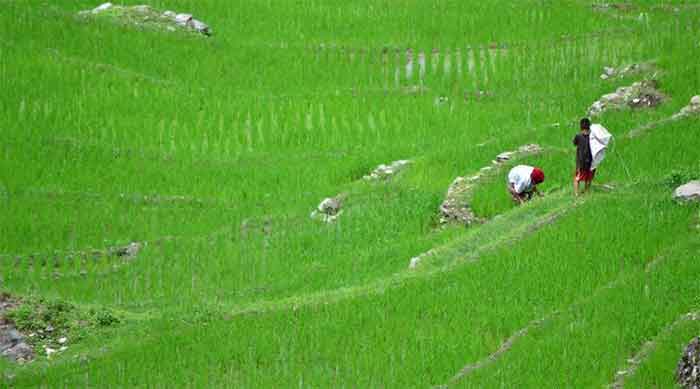
As the attention of people of India is focused on agriculture in the context of the farmers’ movement, this is a good time to initiate a debate on exactly what sort of alternative system of farming and food the country needs. It is not enough to criticize the existing system, we should be clear about what we actually need. If there is no clarity, then in the name of ‘reforms’ we can even be pushed from a bad situation to a situation which is even worse.
In a recent article published on November 25, 2020 by Countercurrents.org ( Social Agro-Ecology is The Key to The Real Progress and Security of Food and Farming Systems) I had defined Social Agro-Ecology as the ‘’meeting point of equality and environment , justice and safety , of livelihood and health” and argued strongly for a farming and food system based on this. But this is in a more general context and applies to the entire world. In the present context of farmers’ movement we need to look in detail at the more specific situation in India.
India is blessed with a diversity of agro-climatic and agro-geographical situations calling for a highly decentralized approach to farm development. This reality has always been there and so over-centralization in farming should never have taken place. This tendency which increased after the green revolution has been harmful for Indian agriculture and should be given up. Decentralized approach which is able to look at special local needs and in this context can utilize fully the traditional wisdom in all respects but particularly in the context of diversity of seeds and water/moisture conservation is really needed.
The agricultural development in India has been characterized by highly uneven development. One aspect of this is regional imbalances. Another aspect is imbalance between main cereals on the one hand and millets, legumes, oilseeds on the other hand. All these imbalances should be corrected.
India should strive to obtain self-reliance in all staple foods including oilseeds and edible oils. This self-reliance can be and should be achieved as soon as possible. Import of all unnecessary luxury foods should be avoided.
Imports of food and farm produce which directly harm our farmers should be curbed. Imports of all hazardous foods including all GM foods should be strictly banned. As GM foods and crops are very harmful in many contexts, all GM food and non-food crops should be banned.
As far as possible an effort should be to try to make all areas largely self-reliant in terms of meeting their staple food needs of cereals, millets, edible oils, legumes, vegetables etc. The concept of food-miles being less ( food being consumed nearer to its production ) should be respected. All regions should try to produce enough of their staple foods plus have some local storage for difficult times. All areas should strive to produce at least some extra food to be donated to fighting hunger in any part of the country and world wherever people are hungry and need food due to their crop-failure or other factors. Traditional practices like free langar and community kitchens should be honored and promoted.
Ending hunger and malnutrition should be a top priority of the country and to achieve this top priority should be given to farming and food production. Adequate resources should be allocated to the farm sector and these should directly reach farmers. The tendency of giving subsidies to industrial interests in the name of farming sector and farmers should be completely stopped.
Farm and food processing should get the maximum encouragement at the rural decentralized level, the entire effort being led by rural women. The big contribution of women to farming and food processing should be recognized and respected. There should be curbs on wasteful and harmful processing which destroy the nutrition value of natural food, or introduce harmful substances in the course of processing.
Ecologically farming practices should be promoted at all levels. India should be promoted as a centre of safe, healthy and highly nutritious food produced by ecologically protective methods. Farmers and villages which excel in ecologically protective farming methods and production of high nutrition and safe foods should get generous rewards from the government and the community, in addition to fair price. To be more specific, farmers and villages using farming methods which are closely involved with protection of soil fertility and soil-organisms, conservation of water, protection of bio-diversity with special emphasis on protection of pollinators, production of safe and nutritious staple food and essential raw materials ( such as cotton and jute) should be ensured a sustainable and satisfactory livelihood and should be rewarded and honored as well.
Huge monocultures should be avoided and as far as possible mixed farming systems which combine the production of several staple foods with animal husbandry, bee-keeping etc. should be followed. Attempts should be made to protect and revive traditional diversity of seeds so that farmers can be self-reliant in terms of their most basic need–a diversity of seeds needed for their local conditions.
Farm animals should get even more attention due to their higher contribution and need in ecologically protective, organic/natural farming systems. All relations with farm animals, whether cow or earthworm or bee or frog, should be based on respect for their contribution and on compassion.
Great respect should be given to the contribution of farm workers. Government and community policies should facilitate and encourage landless farm workers/ rural workers to get some land for cultivation, expanded kitchen garden etc. while ensuring good wage and a fair deal to them.
Farming should be on the basis of small( and medium ) farmers. Farmland ownership by corporate interests and very big land holdings by big landlords should not be allowed. Ceiling laws should be implemented and land above ceiling limit should be distributed among landless rural households.
Diversion of food crops for production of liquor, wine, luxury foods and non-essential raw materials should be discouraged. The number one priority use of farmland should always be for ending hunger and malnutrition by ensuring adequate production of healthy staple foods. Reduction of consumption of liquor, tobacco, meat, highly processed and rich luxury food should be discouraged ( not banned) by official food policy in the interests of ensuring availability of wholesome and nutritious food to all.
In villages government can directly buy a significant part of the crop by paying immediate or even advance fair price to farmers, and then this part of the crop ( cereals, millets, oilseeds, pulses) can be stored within the village for ration shop, anganwadi and mid-day meal cooking centre. When mid-day meal is cooked for schoolchildren, at the same time food can be cooked for providing at least one nutritious cooked meal daily to any destitute or very needy persons staying in the village. Of course government should make other purchase also for city ration shops and nutrition centers, and for food security.
Such a food and farming system will contribute greatly to ensuring sustainable, satisfactory and creative livelihoods in farming while also ensuring the availability of adequate, nutritious and safe food for all, at the same time also promoting socio-economic equality, bio-diversity, protection of environment and welfare of all forms of life.
Bharat Dogra is a veteran journalist who has received several awards for reporting on distress as well as constructive work in remote rural areas.
SIGN UP FOR COUNTERCURRENTS DAILY NEWSLETTER















































